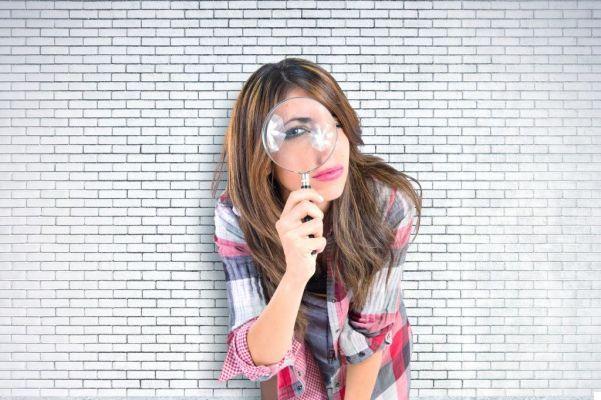
“Men cannot be more perfect than the sun. The sun burns with the same light with which it heats. The sun has spots. Ungrateful people only talk about the spots. The grateful speak of light ”, wrote the poet José Martí many years ago.
This reflection has a profound Taoist background and means that in every person, project and action two parts can coexist, one positive and the other negative. We are the ones who choose which side to focus on.
Unfortunately, there are people who have only learned to see the sun's spots, avoiding seeing the light and perceiving its heat. They are those people who focus on the small mistakes of others and avoid appreciating their virtues.
These people have a habit of looking at others with a magnifying glass to detect any defects, and they don't realize that they should look in the mirror first. The problem is that interacting with them could damage our self-esteem, because these people not only make us feel guilty for our weaknesses and mistakes, but they also make us believe that we are worthless.
How to identify critical people?
These people always put their finger in the sore, take a negative attitude with which they try to undermine your morale. You will find out why:
- However much you do for them and try to help them, they will always remember that time you were not available.
- Even if you are right, they will go to great lengths to highlight small details of your speech to generate an argument.
- Even if you manage to do amazing things, they will continue to remind you of your failures.
- They always find little mistakes in everything you do, even when things are going well.
- They are able to see the speck in the eye of others, but they do not see their mistakes.
- They express opinions from a reductive, partial and simple point of view, which does not take into account the general framework.
- They see life in black and white assuming the attitude of the type "all or nothing", for these people either you do things right or wrong, there are no intermediate points.
- They are not self-critical, they do not like to feel judged and whenever they can they will evade their responsibilities.
- They judge others with a very rigid standard but do not apply the same values and criteria to themselves.
Judging others is a common habit of frustrated people
Without realizing it, we all tend to replicate the way of relating that we have learned in the family. Therefore, these people are likely to have grown up in a home where adults only fixated on their mistakes. If as children they received attention only for their mistakes, it is understandable that they developed this way of relating to others. In practice, these are people who have not learned to relate in a positive and assertive way.
Nonetheless, these criticisms usually come from deep frustration. These are usually people who do not feel satisfied with their life, so instead of looking in the mirror, which would be extremely painful because they would have to admit their failure or dissatisfaction, they prefer to focus on the mistakes of others.
These people do not feel satisfied with the decisions they have made, perhaps because they have been imposed on them by others and are experiencing a profound inner conflict. Thus, criticizing others allows them to shift the focus of attention away from themselves. As Antoine de Saint Exupery also wrote: "it is much more difficult to judge oneself than to judge others".
In other cases, the tendency to criticize everything and everyone is a defense mechanism. In practice, the person needs to justify their unsatisfactory life path by discrediting others. Think: "I'm not that bad after all, look what happened to the guy ..." or "after all I'm not so bad, look what the guy is doing ..."
Of course, this means that any of us can become a critical person at any time. So, before directing the magnifying glass towards others, we should make sure that we have taken a good look at ourselves in the mirror.
How to deal with critical people?
If you empower them, people who always criticize can hurt you a lot. Not only can they affect your reputation in front of others, but by dint of destructive criticism, they can seriously damage your self-image.
Do not get involved in an argument with these people, as they usually react very badly and do not accept your reasons. If attacked, they respond negatively because your words breach the fragile protective shield they have built around their ego.
A good strategy for dealing with people who criticize comes from Transpersonal Psychology, which applies one of the principles of aikido, a martial art of Japanese origin that is purely for defensive purposes and is based on the use of the opponent's attack force. , not to cause him harm, but only to remove him or put him out of action.
What happens when we apply this principle to conflicts in interpersonal relationships? That instead of getting into a vortex of emotional reactivity, we focus on the fact that this criticism does not cause us harm. So we don't take on the role the other person wants to impose on us, so he can't harm us.
For example, in the case of a destructive criticism, the person can be asked: "How do you think your criticism can help me improve?" or "what would you have done in my place to get better results?" In this way, you do not attack the person, but return the blow to him, prompting him to reflect on his words. In fact, with this strategy you could also stimulate a constructive approach, transforming a situation full of negativity into something positive.
- 49


























